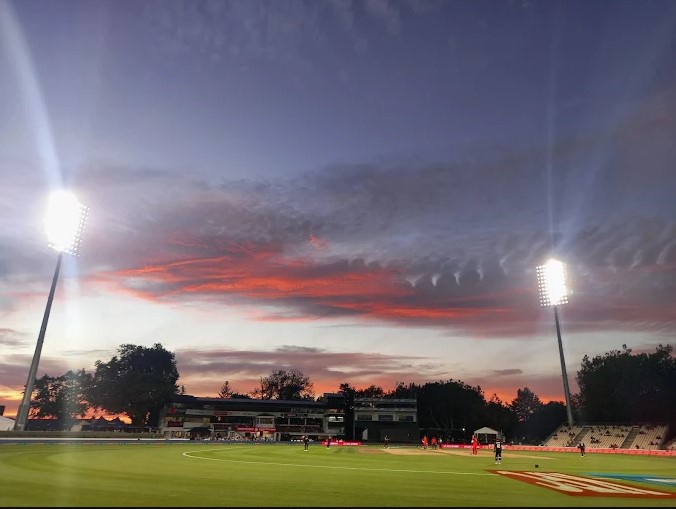Seddon Park: Cricket grounds come in all shapes and sizes, each adding its own character to the game. One such ground with a distinctive charm and strategic importance is Seddon Park, located in Hamilton, New Zealand. Known for its village green setting and well-balanced pitch conditions, it has hosted a variety of international fixtures, including Tests, ODIs, and T20Is.
Table of Contents
A defining characteristic of Seddon Park is its boundary dimensions, which significantly influence the tactics employed by teams. This article explores the layout, boundary lengths, and how players and teams adapt their strategies to this picturesque venue.
Stadium Overview
Seddon Park is one of New Zealand’s most scenic cricket grounds, often praised for its lush outfield and close-to-the-action feel for spectators.
| Attribute | Details |
|---|---|
| Location | Hamilton, New Zealand |
| First International Match | 1981 (Test), 1981 (ODI) |
| Seating Capacity | Approx. 10,000 |
| Ends | Members End, City End |
| Surface | Grass, typically batsman-friendly |
| Primary Use | International & Domestic Matches |
| Home Team | Northern Districts, New Zealand Cricket |
Boundary Lengths at Seddon Park
Though not the smallest ground in New Zealand, Seddon Park has relatively short and symmetrical boundaries. The size of the boundaries can vary slightly depending on the pitch used and ICC regulations for particular formats.
| Direction | Approximate Length (in meters) |
|---|---|
| Straight (Long On/Off) | 62 – 66 m |
| Square (Deep Midwicket/Point) | 68 – 72 m |
| Behind Square (Third Man/Fine Leg) | 60 – 65 m |
| Long Boundaries (Deep Cover/Deep Midwicket) | 70 – 74 m |
These dimensions fall on the smaller side of international standards, which typically range between 65 to 85 meters depending on the format and venue.
Pitch Position & Its Effect on Boundary Size
Seddon Park, like many modern venues, features multiple central pitches. When the match is played on pitches toward one side of the square, the boundary becomes asymmetric.
| Pitch Position | Short Side (m) | Long Side (m) |
|---|---|---|
| Center Strip | 68 | 68 |
| Toward City End | 62 | 74 |
| Toward Members End | 63 | 73 |
This variation is crucial in T20s, where teams exploit short sides for power hitting, while bowlers and captains devise defensive plans for the longer boundaries.
Impact on Different Match Formats
T20 Internationals
Shorter boundaries combined with flat decks make Seddon Park an ideal venue for high-scoring T20 matches. The average first-innings score in T20Is here hovers around 170-180 runs. Batsmen tend to dominate, especially in the powerplay and death overs.
One Day Internationals
In ODIs, captains often look to bat first to capitalize on the quick outfield and manageable boundaries. Scores above 280–300 are common, with boundary-hitting being a key feature in innings acceleration.
Test Matches
Although less frequent, Tests at Seddon Park typically favor batsmen early on. However, as the game progresses into days 4 and 5, the pitch often shows variable bounce and turn, offering a balanced contest. The short boundaries, though, still reward counter-attacking play.
Comparison with Other Grounds
To understand how Seddon Park stands in the international context, here’s a comparison of its boundary sizes with other notable venues:
| Venue | Straight Boundaries | Square Boundaries |
|---|---|---|
| Seddon Park, NZ | 62–66 m | 68–72 m |
| Eden Park, NZ | 55–60 m | 60–65 m |
| MCG, Australia | 75–80 m | 85–90 m |
| Lord’s, England | 65–70 m | 70–75 m |
| Sharjah, UAE | 60–65 m | 55–60 m |
Seddon Park’s dimensions make it more batsman-friendly than larger grounds like the MCG or Lord’s but offer more challenge than ultra-small venues like Eden Park or Sharjah.
Strategic Implications
For Batsmen
- Power hitters specifically target the straight boundaries.
- Reverse sweeps and ramps are more productive with short fine-leg/third-man boundaries.
- Timing becomes more important than brute force due to the quick outfield.
For Bowlers
- Spinners use flight and wider lines to force batters to hit to longer boundaries.
- Pace bowlers often rely on yorkers and slower balls, especially when bowling to the shorter sides.
- Fielders are stationed strategically at the boundary to cut off lofted shots, especially in the death overs.
Notable Matches at Seddon Park
| Match | Year | Highlight |
|---|---|---|
| NZ vs India (Test) | 2020 | Kyle Jamieson’s 5-for on debut |
| NZ vs England (Test) | 2019 | Match drawn after big first-innings totals |
| NZ vs India (ODI) | 2020 | India chased 273 easily; boundary play key |
| Super Smash T20 (Multiple Years) | — | Known for close finishes and high scores |
These matches underscore the ground’s reputation for high-scoring thrillers and its tendency to offer a good contest between bat and ball.
Field Settings and Tactical Adjustments
At Seddon Park, boundary protection becomes critical, especially in shorter formats. Common tactical setups include:
- Deep square leg and deep cover to protect against slogs and drives.
- Third man and fine leg often pushed back in death overs.
- Midwicket traps used against players who prefer to go over the leg side.
Seddon Park, with its intimate dimensions and beautiful surroundings, is a venue that encourages aggressive cricket. The shorter boundaries make it a batter’s haven, yet the balanced pitch offers enough assistance to bowlers who execute plans smartly. Understanding the layout and dynamics of boundary lengths here is essential not only for players and coaches but also for fans looking to appreciate the strategic layer of the sport.
As T20 cricket continues to evolve and ODI cricket becomes more aggressive, grounds like Seddon Park will remain pivotal arenas where game plans hinge on just a few meters — the crucial distance between a six and a catch on the boundary.


